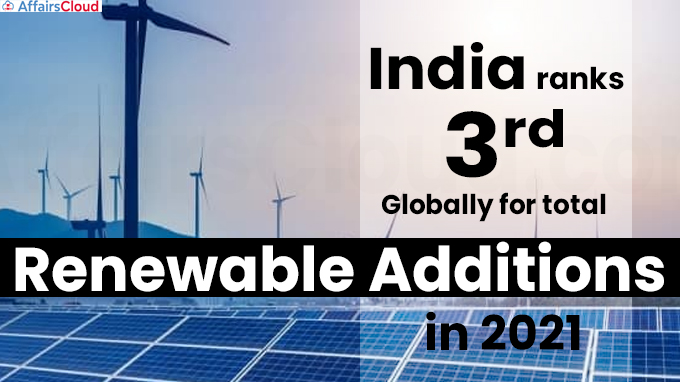
According to the Renewables 2022 Global Status Report (GSR 2022) published by the global renewable energy community REN21, India placed third in the world for total renewable power capacity additions in 2021, with 15.4 GW (giga watts), following only China (136 GW) and the United States (US) (43 GW).
- The GSR 2022 report is the 17th in a series of annual reports that tracks global renewable energy deployment.
The GSR 2022 presents a world map of renewable energy shares by country for the first time, highlighting progress in some of the leading countries.
Concerns Of the Report
- The GSR 2022 warns that the global renewable energy transition is not taking place, making it doubtful that the world can fulfil important climate targets this decade.
- It also stated that, despite the promise of a worldwide green recovery in the aftermath of the COVID-19 pandemic, the world has missed the historic opportunity to “build back better”.
India’s Performance
i. According to the report, India installed 843 MW (mega watts) of hydropower capacity in 2021, bringing the overall capacity to 45.3 GW.
ii.India was the second-largest market for new solar PV (Photovoltaic) capacity in Asia and the third-largest globally (13 GW of additions in 2021).
- For the first time, it surpassed Germany (59.2 GW) for fourth place in total installations (60.4 GW), followed by China (305.9 GW), US (121.4 GW) and Japan (78 GW).
iii. India was ranked third globally for total installed wind power capacity (40.1 GW), behind China, the US, and Germany.
Sector-Wise Global Performance
The 2022 report revealed that the global share of renewables in final energy consumption has stagnated, rising just marginally from 10.6% in 2009 to 11.7 % in 2019, and the global shift to renewables is not taking place.
i. In the electricity sector, record additions in renewable power capacity (314.5 GW, up 17% from 2020) and generation (7,793 terawatt-hours) failed to keep up with a 6% growth in overall electricity usage.
ii.In heating and cooling, the renewable share in final energy consumption climbed from 8.9% in 2009 to 11.2 % in 2019.
iii. The lack of progress in the transportation sector, where renewable energy accounts for nearly a third of global energy consumption, is particularly concerning, as it went from 2.4 % in 2009 to 3.7 % in 2019.
Note: Between 2009 and 2019, China’s final energy consumption climbed by 36%.
Renewable Energy & the UNFCCC – COP26
i. A record 135 countries agreed to achieve net zero greenhouse gas (GHG) emissions by 2050 in the lead-up to the UN Framework Convention on Climate Change (UNFCCC)—Conference of Parties—26 (COP-26), held in Glasgow, Scotland in November 2021.
- Only 84 of these countries had renewable energy targets for the entire economy, and only 36 had renewable energy targets of 100 %.
ii.The COP26 declaration highlighted the need to reduce coal use for the first time in the history of UN climate summits, but it did not call for targeted coal or fossil fuel reductions.
Note: Despite the fact that some governments have made political commitments to achieve net zero emissions, these are still to be accomplished.
Key Inferences
i. Despite significant green recovery measures in many countries, the strong economic rebound in 2021—a 5.9% gain in global real Gross Domestic Product (GDP)—led to a 4% increase in final energy consumption, offsetting renewables growth.
ii.Fossil fuels provided the majority of the increase in global energy demand in 2021, resulting in the biggest increase in carbon dioxide (CO2) emissions in history, up more than 2 billion tonnes globally.
iii. With the highest jump in energy prices since the 1973 oil crisis, the year 2021 also marked the end of the era of cheap fossil fuels.
iv.The invasion of Ukraine by Russia in 2022 worsened the ongoing energy crisis, generating an unprecedented commodities shockwave.
- This weighed hard on global economic development and shook the more than 136 countries that rely on fossil fuel imports.
United Nations Framework Convention on Climate Change (UNFCCC COP27)
The 27th session of the Conference of the Parties (COP 27) to the UNFCCC will take place in Sharm El-Sheikh, Egypt.
Chair of COP 27 – Dr. Mostafa Madbouly, Prime Minister of the Arab Republic of Egypt
COP27 President – Designate – Dr. Sameh Shoukry, Minister of Foreign Affairs of the Arab Republic of Egypt

